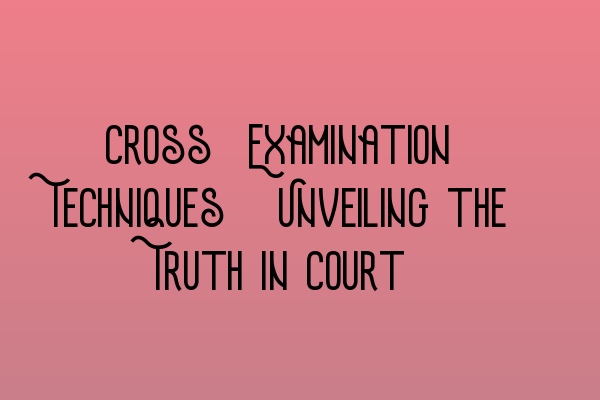Cross-Examination Techniques: Unveiling the Truth in Court
Welcome to the SQE Criminal Law & Practice Law UK blog! In this article, we will delve into the art of cross-examination, a crucial skill for any criminal law practitioner. Cross-examination is the process of questioning witnesses presented by the opposing party in order to challenge their credibility, expose inconsistencies, and ultimately uncover the truth. Mastering effective cross-examination techniques can make a significant difference in the outcome of a case.
The Importance of Cross-Examination
Cross-examination serves as a means to test the reliability and accuracy of witness testimony. A skilled cross-examiner can bring out crucial details, expose bias, and cast doubt on the credibility of witnesses. By probing into inconsistencies, contradictions, or ulterior motives, the truth can be revealed.
When cross-examining, it is essential to maintain a professional demeanor. Remember to listen attentively, ask concise and focused questions, and always be prepared to adapt your strategy based on the witness’s responses. Let’s explore some effective techniques that can help in unveiling the truth during cross-examination:
Techniques for Effective Cross-Examination
1. Leading Questions
Leading questions can be powerful tools during cross-examination. By asking questions that suggest the desired answer, you can control the direction of the witness’s testimony. For example, instead of asking, “Did you see the defendant at the scene?” you could ask, “You saw the defendant at the scene, correct?” This technique can help elicit affirmative responses that support your case.
2. Impeachment
Impeachment involves challenging the credibility of a witness by highlighting any inconsistencies, contradictions, or biases. Carefully review the witness’s prior statements, deposition testimony, or other evidence that can be used to undermine their credibility. By exposing discrepancies, you can weaken the opposing party’s case and strengthen your own.
3. Controlling the Witness
As the cross-examiner, it is essential to maintain control over the witness to ensure that they answer the questions directly and honestly. Use techniques such as interrupting non-responsive answers, seeking “yes” or “no” responses, and rephrasing questions to clarify or elicit a specific response. By maintaining control, you can prevent the witness from evading important issues or diluting the impact of your questions.
4. Exhibits and Documents
Utilizing exhibits and documents effectively during cross-examination can support your line of questioning and strengthen your case. Presenting photographs, records, or other physical evidence can help reinforce your arguments and counter the witness’s testimony. Make sure to prepare and organize your exhibits in advance to ensure smooth presentation in the courtroom.
Conclusion
Cross-examination is a critical aspect of criminal law practice that can uncover the truth and have a significant impact on the outcome of a case. By mastering effective cross-examination techniques, you can challenge the credibility of witnesses, expose inconsistencies, and present a compelling case. Remember to approach cross-examination with professionalism and preparation, utilizing leading questions, impeachment, controlling the witness, and exhibits to your advantage.
If you’re interested in further developing your skills in criminal law practice, we offer comprehensive SQE 2 preparation courses and SQE 1 preparation courses to help you excel in the SRA SQE exams. Additionally, practicing with SQE 1 practice exam questions and SQE 1 practice mocks FLK1 FLK2 can enhance your knowledge and test-taking abilities. Stay updated with the latest SRA SQE exam dates to ensure proper planning and preparation for your legal career.
